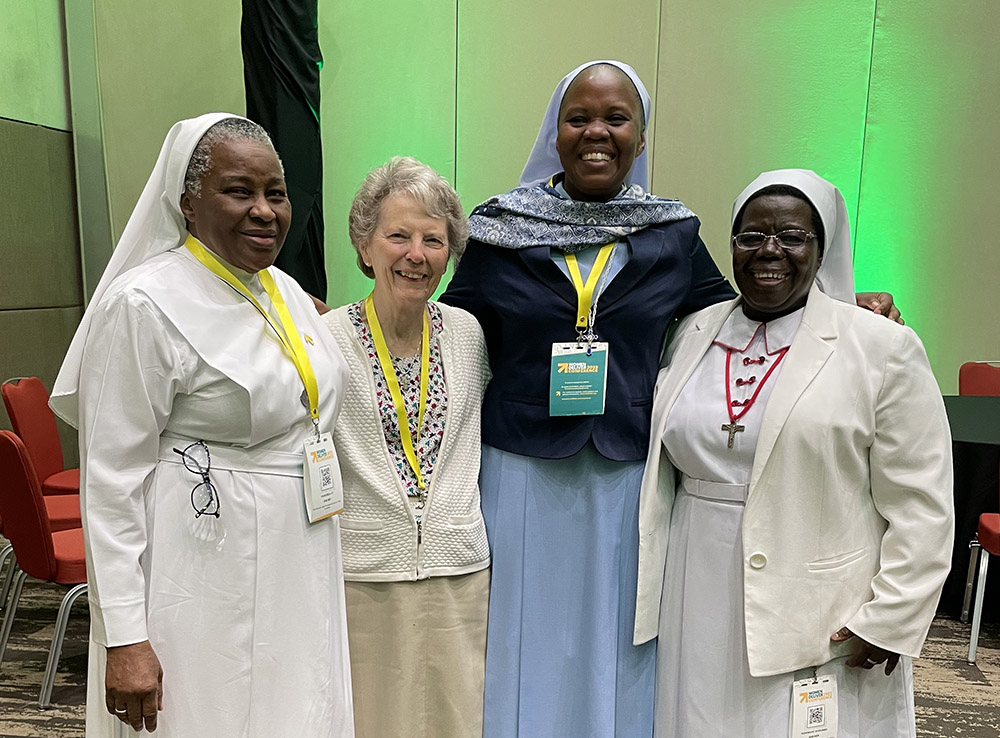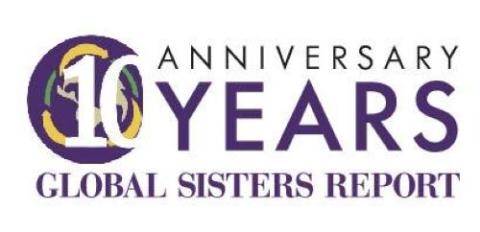
Presentation Sr. Joyce Meyer (second from left), international liaison for Global Sisters Report, meets with, from left, Sr. Francisca Ngozi Uti, Handmaids of the Holy Child Jesus in Nigeria; Sr. Hedwig Muse, Little Sisters of Mary Immaculate in Kenya; and Sr. Rosemary Nyirumbe, Sisters of the Sacred Heart of Jesus in Uganda, during the Women Deliver 2023 Conference held July 17-20 in Rwanda. (GSR photo)
Editor's note: Global Sisters Report, the dynamic online community that reports on and gives voice to Catholic women religious around the world, is celebrating its 10th anniversary this year. Join us as we take another look at stories and columns published in 2014 with new updates and reporting.

I am not a trained journalist, but as a former English teacher, I have learned so much from being involved with Global Sisters Report about journalism, editing and writing from my colleagues.
It has been a great joy for me to work with sister-writers these past 10 years since Global Sisters Report was launched. Through their columns and stories, new voices of sisters from around the world are heard every day. The silence that has often shrouded them is broken through and they become visible in new ways.
Sisters can be found in the most remote regions of the globe, serving God and people who would be forgotten without these women. I discovered many of them when I was with the Conrad N. Hilton Fund for Sisters. The United Nations Millennium Goals focused on the "least developed" countries of the world and those became our focus as a funding organization.
I discovered so many extraordinary situations during those years and all I could do was record them in my reports to the Hilton fund's board. Today, Global Sisters Report is a worldwide news organization that collects similar extraordinary stories and shares them with our global readers. They are stories of education, health care, social services and pastoral work, from both safe and conflict areas of the world. They are also stories of faith and resiliency, individual and community creativity and resourcefulness, and of utter dependence on God.
My particular part of the marvelous mission of GSR is to seek out sisters from as many countries as I can to write columns about their ministry, their spirituality and religious life. It is challenging for many of the sisters whose first language is not English, but instead, may speak different African, Latin American, Asian or other languages. It is daunting and takes courage to translate one's natural thoughts into another language.
Advertisement
So it is not surprising that sisters hesitate to write. This is often true even for those whose everyday speaking language may be English. I remember when I lived in Zambia where I was teaching, the English required of the students was British. As an American, I had to learn all the usage and meaning differences between American and British words and phrases in order to teach. I also had to assist the students in translating their Zambian language thoughts into English. It was a constant learning experience for me, and this continues as I write and edit.
It isn't only sisters from other countries or languages who sometimes hesitate to write for Global Sisters Report. U.S. sisters also at times decline invitations to write, finding it daunting to risk putting thoughts into the written word. I have great admiration for each of the sisters who have taken the risk to write.
From our beginning years at GSR, all columns needed to be written in English, which left out sisters from Latin America, Asia and many countries in Africa. We recently overcame the language hurdle for the Spanish-speaking world and now have a special section for them on our website. Our Spanish-speaking journalists, working with international editor Soli Salgado, along with experienced translators who work under the guidance of Sr. Helga Leija, also translate stories and columns submitted in Spanish into English, so they are accessible to English readers as well.
Our next goal is to bring more French-speaking sisters, with their gifts and reflections on religious life and ministries, to Global Sisters Report with a French edition. Timing is uncertain, and funding, of course, is one challenge we face incorporating other languages into our work.
So, how have I navigated this adventure of recruiting writers and overcoming language issues? The first challenge I usually find is convincing sisters that they have something to write about. Sisters are extremely modest and frequently do not see that what they do every day can become a valuable story to share with others. My job is to convince them that the majority of people in the world have little, if any, idea where some of the countries are where sisters serve. Their stories enrich others' perspectives of the world. Many people would even be amazed that sisters are serving families in places of war or conflict. Old images of sisters often prevail over the reality of today's diverse experiences.
Learning about the world is an important value these stories offer. I remember when I first began working at the Hilton Fund for Sisters, I had moved from Aberdeen, South Dakota, to Los Angeles and did not have a travel agent. I found a travel agent in LA who helped me navigate the new world I had entered. My new life gave her glimpses into countries she had never even heard of. I recall her telling me she went to a site called Exotic Vacations to find a way to get me to a place in the Democratic Republic of Congo where I planned to travel.
Once I have convinced a sister she has something valuable to share, I ask her to write about it or tell me informally about her ministry that she enjoys and its impact on her life. Once I have an idea about how her story might develop, my next step is to send her a list of questions to which she can respond. From there, she may take the risk to write her own story, or I may assist her in writing her story. Whatever is the way forward, there is an ongoing conversation between us until the story is formed. It is a dialogic process.
If I am the one to write her story from the answers she has sent, I return it to her to make sure I have understood what she wanted me to understand. She makes corrections or additions and returns it to me. I finish it up and send it on to the next level of editing.
As sisters read others' stories, many gain the courage to write themselves and send stories to me for a first edit. It is exciting, satisfying and a great joy for the sister who wrote it, and for me, to have her story published worldwide.
In addition to assisting sisters in their writing, I also write my own reflections. As we prepared for this anniversary, I reviewed the blogs I had written since 2014 and was surprised at the diversity of stories and reflections. I noticed how many of my stories were about different aspects of agriculture. This interest is motivated by the hunger that so many people are suffering in the world today because of the consequences of climate change and farming methods that have degraded our soils. So many sisters, especially in the Global South, are farmers and are all learning regenerative agriculture methods. They give me hope.
I never dreamed I would be doing this work when Tom Fox, the then-publisher of the National Catholic Reporter, came to ask for a grant so many years ago. I have gained much insight and skill working with first-class journalists. My joy abounds. They work hard writing and editing each others' work and best of all, find great joy in searching out and writing stories about sisters' lives and ministries, giving them voice and bringing them into the light.







